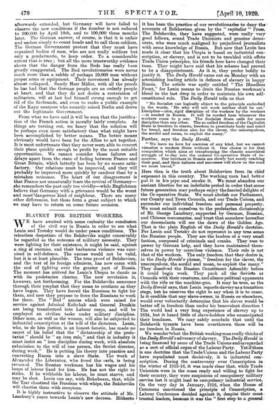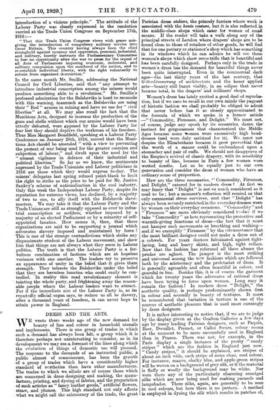SLAVERY FOR BRITISH WORKERS.
WE have awaited with some curiosity • the conclusion of the civil war in Russia in order to see what Lenin and Trotsky would do under peace conditions. The relentless despotism• of the Bolsheviks might conceivably be regarded as the outcome. of military necessity. They were fighting for their existence, it might be said, against a. ring of enemies, and their barbarous violence was exer- cised in self-defence. The' excuse would not be valid, but it is at least plausible. The true proof of Bolshevism, and the test of its foreign admirers, has now come with the end of fighting over the greater part of Russia. The moment has arrived for Lenin's Utopia to dazzle us with its proletarian charms. The new revelation is, however, not forthcoming. For the Bolsheviks announce throul3he:iienir prophet that they mean to continue as they have begun. They have forced the Russians to fight 'for them, and now they propose to force the Russians to.work for them. The " Red " armies which were raised for service against Admiral Koltchak and General Denikin, are being transformed into Labour corps, and will be employed on civilian tasks under military discipline. Other men, as well as the women, will also be subjected to• industrial conscription at the will of the dictators. Lenin, who, to do him justice, is an honest fanatic, has made no secret of his belief that the " dictatorship of the prole- tariat " should be " an iron rule," and that in industry it must insist on " iron discipline during work, with absolute submission to the will of one person, the Soviet director, during work." He is putting his theory into practice and converting Russia into a slave State. The work of Alexander the Liberator, who freed the serfs, is being reversed. The Russian workman has his wages and his hours of labour fixed for him. He has not the right to strike. If he withholds his labour, he must starve, and may be shot. Lenin can say, with Rehoboam, that, while the Tsar chastised the Russians with whips, the Bolsheviks will chastise them with scorpions. It is highly instructive. to observe the attitude of Mr. Leasbury's paper towards Lenin's new decrees. Hitherto it has been the practice of our revolutionaries to deny-the accounts of Bolshevism given by the " capitalist "' Press. The Bolsheviks, they have suggested, were really very good fellows, sound Trade Unionists and genuine demo- crats, who were much maligned by 'prejudiced journalists with some knowledge of Russia. But now that Lenin has made it clear that his Utopia is based on industrial con- scription, or slavery, and is not to be troubled with effete Trade Union principles, his friends here have changed their tune. They might have said that his scheme• had proved to be a disappointment. As it is, they prefer boldly to justify it. The Daily Herald came out on Monday with an astomshing leading article in defence of slavery in happy Russia. The article was aptly entitled " The Bloodless Front," for Lenin means -to drain the Russian workman's blood to the last drop in order to maintain his own self- constituted rule. The Daily Herald tells us that
" No Socialist can 'logically object to the principle embodied in the words, ' He 'who will not work neither shall he eat.' Discipline—iron, rigid discipline of -the workers by the workers —is needed in Russia. It will be needed here whenever the workers come to p wer. The Socialist State calls for more discipline than any other. The so-called freedom of the Capitalist State is freedom to starve, freedom to prostitute body and mind for bread, and freedom also for the clever, the unscrupulous, the sordid and mean, to exploit the many."
Further, says the Daily Herald, "We have no -love for coercion of any kind, but we cannot visualise a modern State without it. Our choice is for that compulsion which aims. at• transforming the ohaotic anarchical struggle of to-day into the ordered Co-operative State of to- morrow. Our brothers in-Russia are slowly' but surely reaching their goal, and, their failures.and suceesses.will show-us the road we must traveL" Here then is the truth about Bolshevism from its chief exponent in this country. The working man had better put it in his pipe and smoke it. We must abandon-our ancient liberties for an indefinite period in order that some future generation may perhaps- enjoy the fancied delights of the Co-operative State. We must abolish our Parliament, our County and Town Councils, and our TradeUnions, and surrender our individual freedom and personal property. We must submit ourselves to the proletarian dictatorship of Mr. George Lansbury, supported by German, Russian, and Chinese mercenaries, and trust that somehow hereafter our descendants will see the dawn of the Golden Age. That is the plain English of. the Daily Herald's doctrine. For Lenin- and Trotsky do not represent in any true sense the-Russian people. They are-the leaders of a- very small faction, composed of criminals and cranks. They rose to power by. German help, and they have maintained• them- selves'- in power by merciless violence. Their rule- is not that of the workers. The' only freedom that they desire • is, in the Daily- Herald's phrase, freedom for the clever, the unscrupulous, the. sordid -and mean, to-exploit the- many " They dissolved the Russian. Constituent AdAembly before it could begin work. They pack all the Soviets or Councils with their creatures, and silence political opponents with. the rifle• or the machine-gun. It may betrue, as the Daily Herald says, that Lenin regards slaverras a transition stage, but he reserves the right to say when it is to cease. Is it -credible that Any slave-owner, in Russia er elsewhere, would ever voluntarily determine that his slaves would' be better off in freedom than under his benevolent direction ? The world had a very long experience of slavery up to 1834, but it heard little of slave-holders :who emancipated their bondman. We may safely conclude that until the Bolshevik tyrants have been overthrown there will be no freedom m Russia.
We wonder'what the British working man really thinks of the Daily Herald's advocacy of slavery. The Daily Herald is being financed by some of the Trade Unions andis regarded as a sort of official organ of the Labour Party. Yet if there is one doctrine that the Trade Unions and the Labour Party have repudiated most decisively, it is industrial con- scription. During the controversy over Conscription in the winter of 1915-16, it was made clear that, while Trade Unionists were in the mass ready and willing to fight for their country, they were suspicions of compulsory military service' loft it might lead to compulsory industrial service. On the very day in January, 1916, when the House of Commons sanctioned the principle• of Conscription, a Labour Conference decided against it despite their most trusted leaders, boon= it-was the " first step-to-a general,. introduction of a vicious principle." The attitude of the Labour Party was clearly expressed in the resolution carried at the Trade Union Congress on September 17th, 1916 :- "That this Trade Union Congress views with , grave mis- giving the introduction of compulsory military service into Great Britain. This country having always been the chief stronghold against tyranny and oppression, personal, industrial, and military, hereby instructs the Parliamentary Committee to lose no opportunity after the wax to press for the repeal of all Acts of Parliament imposing economic, industrial, and military compulsion upon the manhood of the nation, and to re-establish individual liberty, with the right voluntarily to refrain from organised destruction."
In the same month Mr. Smillie, addressing the National Council for Civil Liberties, said that " any attempt to introduce industrial conscription among the miners would produce something akin to a revolution." Mr. Smillie'x professed admiration for the Bolsheviks is hard to reconcile with this warning, inasmuch as the Bolsheviks are using their '" Red" armies in mining-and have no use for " civil liberties " at all. We may also recall the fact that the -Munitions Acts, designed to increase the production of the guns and shells without which our armies would have been utterly defeated, were Apposed by the Labour Party for fear lest -they should deprive the workman of his freedom. Thus Miss Margaret Bendfield, speaking at a Labour Party Conference on January 28th, 1916, moved that the Muni- tions Act should be, amended " with a view to preventing the pretext of war being used for the greater coercion and subjection of labour," and dwelt upon the need for the " utmost vigilance in defence of their industrial and political liberties." So far as we know, the sentiments expressed by the Trade. Unionists and Labour politicians in 1916 are those which they would express to-day. The miners' delegates last spring refused point-blank to limit the right to strike as the price to be. paid for Mr. Justice Sankey's scheme of nationalization in the coal industry. Only this week the Independent Labour Party, despite its reputation for extreme views, has declined, by a majority of two to one, to ally itself with the Bolshevik slave- masters. We may take it- that the Labour Party and the Trade Unions are still as strongly opposed as ever to indus- trial conscription or serfdom, whether imposed by a majority of an elected Parliament or by a minority- of-self- appointed fanatics. How comes it, then, that these organizations are said to be supporting a journal which advocates slavery imposed and maintained by force ? This is one of-the strange contradictions which strike any dispassionate student of the Labour movement, and show him that things are •not always what they seem in. Labour politics. The truth is that the Labour Party is .a for- tuitous combination of factions which are at hopeless variance with one another. The leaders try to preserve an appearance • of unity in the belief that- it gives- them strength. They tolerate the Bolsheviks, under• the belief that they Bare harmless lunatics who could easily be con- trolled. In reality this mad revolutionary element is tainting the whole party, and. frightening away the reason- able people whom the Labour leaders want to attract.
For if the immediate aim of the Labour Party is, as its reputedly official organ says, to reduce us all to slavery, after a thousand years of freedoni, it, can never hope to attain power in England.



































 Previous page
Previous page